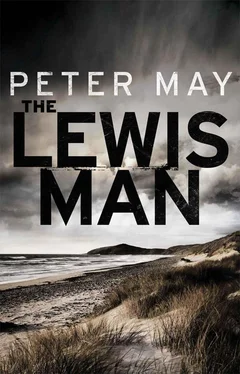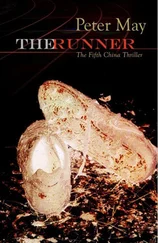Peter May - The Lewis Man
Здесь есть возможность читать онлайн «Peter May - The Lewis Man» весь текст электронной книги совершенно бесплатно (целиком полную версию без сокращений). В некоторых случаях можно слушать аудио, скачать через торрент в формате fb2 и присутствует краткое содержание. Жанр: Триллер, на английском языке. Описание произведения, (предисловие) а так же отзывы посетителей доступны на портале библиотеки ЛибКат.
- Название:The Lewis Man
- Автор:
- Жанр:
- Год:неизвестен
- ISBN:нет данных
- Рейтинг книги:3 / 5. Голосов: 1
-
Избранное:Добавить в избранное
- Отзывы:
-
Ваша оценка:
- 60
- 1
- 2
- 3
- 4
- 5
The Lewis Man: краткое содержание, описание и аннотация
Предлагаем к чтению аннотацию, описание, краткое содержание или предисловие (зависит от того, что написал сам автор книги «The Lewis Man»). Если вы не нашли необходимую информацию о книге — напишите в комментариях, мы постараемся отыскать её.
The Lewis Man — читать онлайн бесплатно полную книгу (весь текст) целиком
Ниже представлен текст книги, разбитый по страницам. Система сохранения места последней прочитанной страницы, позволяет с удобством читать онлайн бесплатно книгу «The Lewis Man», без необходимости каждый раз заново искать на чём Вы остановились. Поставьте закладку, и сможете в любой момент перейти на страницу, на которой закончили чтение.
Интервал:
Закладка:
The only light in the room came from the blue-tinged illumination of his laptop computer screen. He sat alone at the desk, in the dark, the stillness of the house pressing in all around him. The presence of others, in other rooms, seemed somehow only to increase his sense of isolation.
This was the room where he had spent so many hours tutored by Artair’s dad. Where he and Artair had sat, individually or together, listening to long lectures on Hebridean history, or puzzling over mathematical equations. Where the years of his boyhood had passed in suffocating incarceration, freedom glimpsed only occasionally in stolen glances from the window. Marsaili had said he could spend the night on the fold-down settee. But there were too many memories here. The Cyprus-shaped coffee stain on the card table where they worked. The rows of books with their exotic titles, still there on the shelves. The smell of Artair’s dad’s pipe smoke, hanging in the still air in slow-moving blue strands. If he breathed deeply the scent of it remained, even if only in his memory.
Marsaili, fragile and fatigued, had gone to bed some time ago, telling him he could stay as long as he liked, to benefit from Fionnlagh’s wifi. The cursor on his screen winked over a webpage with the crest of the National Galleries of Scotland. Below it, a blue window with cottonwool clouds announced Another World. Dali, Magritte, Miro and the Surrealists . But he had long since stopped looking at it. It had taken him almost no time to confirm his suspicions, and immediately reserve their tickets on the morning flight. He had then spent much of the next hour in deep research.
He was tired. An ache behind his eyes. His body felt punched, bruised, his brain short-circuiting thoughts almost as soon as they appeared. He had no desire to go back to Edinburgh, a return to a painful past he had been unable to put behind him. The best he had been able to do was achieve a little distance. Now Fate was robbing him even of that. For Marsaili there would be no closure without it, while for him it would only serve to reopen old wounds.
He wondered, briefly, how she would receive him if he were to slip softly along the hall to her room and slide beneath the covers beside her. Not for sex, or even for love. But for comfort. The warmth of another human being.
But he knew he wouldn’t. He closed the lid of his laptop and moved silently through the house, shutting the kitchen door gently behind him. He walked up the road in the night to where his tent awaited him. Moonlight reflecting on the still of the ocean was almost painfully bright, stars overhead like the white-hot tips of a billion needles pricking the universe. All that awaited him within the soulless confines of his tent were a cold sleeping bag, a few sheets of paper in a buff folder describing the death of his son, and all the sleepless hours he knew he would have to endure before morning.
THIRTY
It was milder in Edinburgh, a light wind blowing in off the Pentland Hills, the sun dipping in and out from behind bubbles of cumulus, splashing light and colour across this grey city of granite and sandstone.
They had brought overnight bags in case of the need to stay, although Fin was not optimistic that they would find anything other than the places of which Marsaili’s father had spoken. A visit that would take them less than an hour. They took a taxi from the airport, and as it approached Haymarket the driver set his indicator going for a left turn into Magdala Crescent. Fin said to him, ‘Not this way.’
‘It’s a short-cut, mate.’
‘I don’t care. Go up to Palmerston Place.’
The driver shrugged. ‘You’re paying.’
Fin felt Marsaili’s eyes on him. Without meeting them he said, ‘When Padraig MacBean took me out to An Sgeir on his old trawler, he told me the story of how he’d lost his father’s brand-new boat in the Minch. Barely escaped with his life.’ He turned to see her eyes fixed upon him, wide with curiosity. ‘Even though there is nothing to mark the spot where she went down, Padraig said he feels it every time he sails over it.’
‘Your son was killed in Magdala Crescent?’
‘In a street off it.’
‘Do you want to tell me about it?
He gazed past the driver, through the windscreen and the traffic stretching ahead of them along West Maitland Street. Finally he said, ‘No. I don’t think I do.’
The taxi turned into Palmerston Place, past smoke-blackened bay-windowed tenements, a park in early spring leaf, the Gothic grandeur of St Mary’s Episcopal Cathedral, and down the hill to where the red-sandstone church on the corner had been converted to a youth hostel with pillar-box red doors.
It swung up the hill, then, on Belford Road, to drop them in the forecourt of a Travelodge hotel opposite a stone gateway beneath a blue-and-white banner fluttering in the breeze.
‘Dean Gallery,’ Marsaili read when they stepped out of the cab. Fin paid the driver and turned to face her confusion. ‘The Dean is an art gallery?’
Fin nodded. ‘It is now.’ He took her arm and they ran across the road between cars. Through a black, wrought-iron gate they followed a narrow cobbled path up the hill between a high privet hedge and a stone wall. The path opened up then, and curved its way through parkland shaded by tall chestnuts, where bronze statues stood on stone plinths planted on manicured lawns. ‘In the days before the welfare state,’ he said, ‘there was something in Scotland called the Poor Law. It was a kind of social security for the poorest in society, pretty much paid for by the Church. And where there were gaps, sometimes private charities stepped in. The Orphan Hospital of Edinburgh was set up in the early 1700s by the Society for Propagating Christian Knowledge to fill one of those gaps.’
‘This is what you were looking up on the internet last night?’
‘Yes.’ They passed a tarnished sculpture of the Madonna and Child called The Virgin of Alsace . ‘In 1833 the hospital moved into a new building, here on the Dean Estate, and it became known as the Dean Orphanage.’ An Edinburgh lady of indeterminate age with bob-cut silver hair and navy-blue skirts hurried by with a whiff of floral scent that reminded Fin briefly of Marsaili’s mother.
As they rounded the bend at the top of the hill, The Dean swung into view in all its towering sandstone grandeur: porticos, arched windows, four-cornered towers and stone balustrades. Fin and Marsaili stopped to take it in. There was an odd sense of destiny in finding it here at the top of the hill, hidden behind hedges and trees, revealing itself suddenly like a glimpse into history, national and personal. The circle of fate whose first curve had begun with the departure of Marsaili’s father was completed now by her arrival.
Her voice was hushed by awe. ‘This was an orphanage?’
‘Apparently.’
‘My God. It’s a wonderful building, Fin. But no place to bring up orphaned children.’
Fin thought that his aunt’s house had been no place to bring up an orphaned child either. He said, ‘I read last night that originally they were fed on porridge and kale, and that the orphan girls had to make clothes for all the children to wear. I guess things would have been very different in the fifties.’ He paused. ‘But it’s hard to picture your dad here.’
Marsaili turned to him. ‘Are you sure this is where he meant?’
He led her a little further up the hill, and pointed beyond The Dean, to the twin towers of another impressive building in the valley below. ‘Stewart’s Melville,’ he said. ‘A private school. In the days your dad would have been here it was called Daniel Stewart’s College.’
‘Danny’s place.’
Fin nodded. ‘A terrible irony in it, not missed by your dad. The poorest and most deprived children of his generation living cheek by jowl with the most privileged. What was it he said? The turrets at Danny’s had always been a reminder of their place in the world?’
Читать дальшеИнтервал:
Закладка:
Похожие книги на «The Lewis Man»
Представляем Вашему вниманию похожие книги на «The Lewis Man» списком для выбора. Мы отобрали схожую по названию и смыслу литературу в надежде предоставить читателям больше вариантов отыскать новые, интересные, ещё непрочитанные произведения.
Обсуждение, отзывы о книге «The Lewis Man» и просто собственные мнения читателей. Оставьте ваши комментарии, напишите, что Вы думаете о произведении, его смысле или главных героях. Укажите что конкретно понравилось, а что нет, и почему Вы так считаете.












